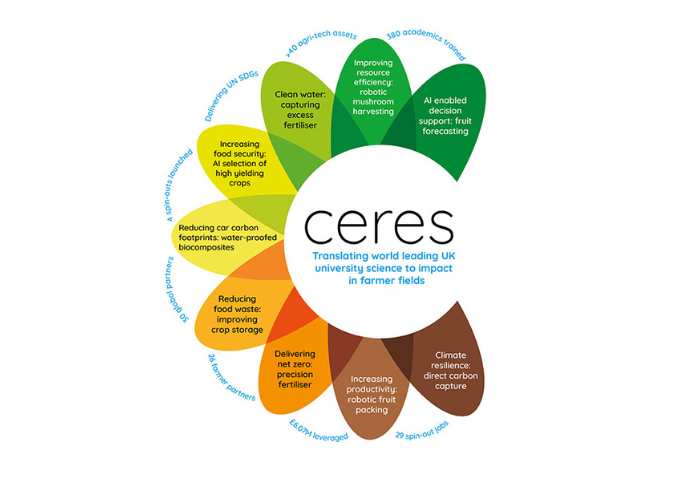Ceres Agri-Tech and University of Lincoln have partnered to present Agri-Tech Innovation as part of an Agri-Science Week in Parliament exhibit on 27-31 January. The team will share highlights from the Ceres Agri-Tech programme that is translating world-class UK university science into real world impact.
Initially funded in 2018 by a £4.8M Research England CCF award as a collaboration between the University of Cambridge, University of Lincoln, University of Reading, University of Hertfordshire and the University of East Anglia, Ceres Agri-Tech Knowledge Exchange Partnership (Ceres Agri-Tech), is a collaborative initiative founded by and located at Cambridge Enterprise, the innovation arm of the University of Cambridge. Ceres Agri-Tech builds upon Cambridge Enterprise’s world class track record in research translation, helping underpin food security, reducing environmental impacts and increasing the sustainability of agriculture.
Supported by grants from Research England’s Connecting Capability Fund and EPSRC Place Based Impact Accelerator Account, to date Ceres Agri-Tech has launched four agri-tech spinouts, which together have created 29 high-value jobs and are developing innovative agri-tech solutions for critical challenges. These spinouts include:
- Fruitcast - AI-enabled decision support and fruit forecasting for improved yield optimisation, waste reduction and improved efficiency
- Agaricus Robotics - intelligent robotic mushroom harvesting
- Cellexcel - waterproofing biocomposites for lightweighting vehicles
Ceres Agri-Tech has a pipeline of over 40 agri-tech innovations with global potential including direct carbon capture for climate resilience, net zero precision fertiliser and improving crop storage for reduced food waste. The pipeline projects all address UN Sustainability Development Goals, such as zero hunger, clean water (and sanitation), responsible consumption and production and industry, innovation and infrastructure.
It is helping to bring together organisations in the UK and around the world to translate leading university science into real-world solutions, with 28 new collaborations, 8 UK civic partners, 30 international partners and 26 farmer partners. Ceres Agri-Tech has leveraged £6.07 million so far and supported the training of more than 380 academics, helping the continued pipeline and positive impact of agri-tech research innovation.
Since 2018, Ceres Agri-Tech has worked closely with university partners Cambridge, Lincoln and UEA, as well as local civic societies, businesses, farmers and growers in the region’s agri-tech cluster. In 2023 Ceres Agri-Tech announced two further formal collaborations.
Led by the University of Lincoln, with the Cambridge University Department of Engineering and Ceres Agri-Tech, Lincam is a collaborative initiative to deliver agri-tech impact in the Greater Lincolnshire and North Cambridgeshire (Lincam) region, funded by a £4.9m Engineering and Physical Sciences Research Council (EPSRC) Place Based Impact Acceleration Account. Already a nationally renowned agri-tech cluster this funding is driving the Lincam region to become an agri-tech gateway for the world – enabling the development of technologies at industrial scale and providing export opportunities for agri-tech companies and inward investment opportunities within both the agri-tech and primary production sectors.
Ceres Agri-Tech is also collaborating with Universities of Lincoln (lead), Cambridge and UEA to develop a truly global Agri-Tech cluster in the Greater Lincolnshire and East Anglia region with £1.49m from Research England’s Connecting Capability Fund (CCF) RED fund. Agri-Tech Global is a designed to translate agri-tech research from the Universities of Lincoln, Cambridge and UEA and build international academic and commercial links to support the onward development and commercialisation of their agri-tech innovations.
Ceres Agri-Tech is a testament to the power of innovation and collaboration, and the positive impact of publicly-funded research. By bridging the gap between research and real-world application, Ceres Agri-Tech is paving the way for a more sustainable, efficient, and resilient agricultural sector.
Dr Louise Sutherland, Director of Ceres Agri-Tech, said: “Ceres Agri-Tech is a crucial link that enables world-leading University research from the UK to solve global challenges facing agriculture, driving sustainability across the environment and lives. Our work is having tangible impacts in the UK and worldwide and showcases the incredible potential of collaboration and publicly funded research to drive positive change.”
Professor Simon Pearson, Founding Director of Lincoln Institute of Agri-Food Technology (LIAT), University of Lincoln, said: "There is little doubt that the UK is a world leader in the diverse set of interdisciplinary sciences that underpin agriculture and food production. Ceres Agri-Tech focuses on the key challenge of translating this science from university labs to farmers’ fields. The Ceres Agri-Tech programme is now proven generating Lincoln’s first spin-outs and high quality jobs that support the national and local economy. Lincoln are proud to be one of the initial partners of Ceres Agri-Tech."
Prof Julian Blow, PVC Research and Innovation, University of East Anglia, said: “As leaders in agri-food research and innovation, we recognise the benefit that the Ceres Agri-Tech partnership has brought to our institution. The agri-tech specific support through Ceres Agri-Tech has proven to be an efficient model for fast-tracking the commercialisation of early-stage agri-tech arising from our research. A number of UEA academics have benefited from the process which has sharpened their understanding of pitching, market needs and developing commercial plans. Ceres Agri-Tech compliments UEA’s ambitious research, innovation and civic strategies, and our vision to solve the challenges of our changing world by working together sustainably.”



